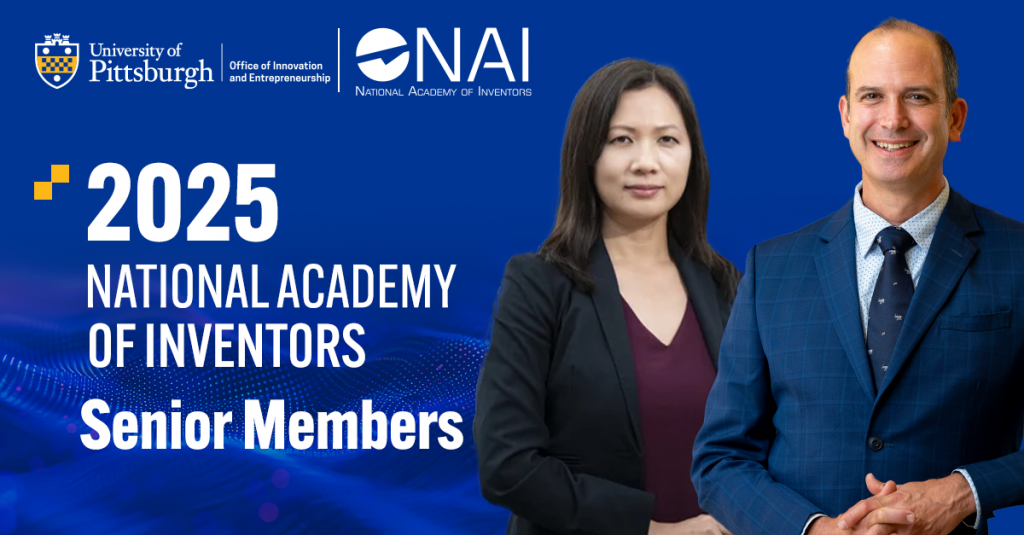Yuan Liu, assistant professor in the Department of Pulmonary, Allergy, and Critical Care Medicine at the University of Pittsburgh School of Medicine, and Juan Taboas, associate professor in the Department of Oral and Craniofacial Sciences at the University of Pittsburgh School of Dental Medicine, have been elected as Senior Members of the National Academy of Inventors (NAI) for the class of 2025.
NAI Senior Members are active faculty, scientists, and administrators from NAI Member Institutions who have demonstrated remarkable innovation producing technologies that have brought, or aspire to bring, real impact on the welfare of society. They also have growing success in patents, licensing, and commercialization, while educating and mentoring the next generation of inventors.

This year’s class of Senior Members includes 162 people from 64 NAI member institutions and is the largest class to date. Collectively, they are named inventors on more than 1,200 U.S. patents.
“Drs. Liu and Taboas epitomize what is possible at Pitt when researchers who are pioneers in their fields of scientific discovery are determined to go the final mile for impact through innovation commercialization,” said Evan Facher, University of Pittsburgh Vice Chancellor for Innovation and Entrepreneurship and Associate Dean for Commercialization at the School of Medicine.
Liu is currently the principal investigator or co-investigator on more than $10 million in research grants focused on developing small-molecule therapies for a range of diseases. Three patents have been issued on Dr. Liu’s discoveries, and many others are in prosecution.
She is the co-founder of two companies. The first, Generian Pharmaceuticals Inc., spun out of the University of Pittsburgh in 2019. In 2022, Generian entered an agreement with a subsidiary of Astellas Pharma Inc. to discover and develop novel small molecules for undruggable therapeutic targets using Generian’s proprietary drug discovery platform for diseases that have limited treatment options.
Liu and her colleagues in the Pitt Aging Institute launched a new company in 2022, Coloma Therapeutics, to develop targeted protein degradation therapies. Two molecules have been advanced to pre-clinical development focused on prostate cancer and breast cancer.
She was named the 2024 recipient of the Pitt Office of Innovation and Entrepreneurship’s Emerging Innovator Award, which recognizes an early-to-mid-career faculty member who has demonstrated an extraordinary commitment to achieving impact for their research through commercial translation.
Liu’s dedication to mentoring the next generation of innovators at Pitt and in Western Pennsylvania is also remarkable. She coordinates the Aging Institute’s participation in the Hillman Academy, a summer training program for Pittsburgh-area high school students interested in STEM education.
Taboas is a multi-disciplinary scientist and mentor with appointments in the Department of Bioengineering, the McGowan Institute for Regenerative Medicine, and the Clinical and Translational Sciences Institute.
He is currently the co-principal and co-investigator on more than $4 million in NIH grants where he focuses on disease mitigating and regenerative therapies for craniofacial and skeletal tissues such as bone, cartilage, and tooth pulp. Four patents have been issued on his discoveries with several others in prosecution. His passion is creating regenerative medicine therapies for children and underserved communities. The Taboas lab is developing stem cell-infused hydrogels to ultimately stimulate regeneration of growth plates in children who have suffered trauma. His lab adapted the technology to serve the need for regenerating tooth pulp in children suffering facial trauma and carious lesions.
Working with the Office of Industry and Economic Partnerships, part of the Office of Innovation and Entrepreneurship, Taboas was introduced to VIC Technology Venture Development, an early-stage investment company that works with academia to commercialize promising technologies. VIC has optioned the pulp treatment technology.
Dr. Taboas is actively supporting commercialization. He worked closely with VIC to obtain $1.6 million in funding from the Small Business Innovative Research (SBIR) program. This funding will be used to conduct preclinical testing of the technology in support of an application for regulatory approval. He will serve as the Chief Scientific Officer of the new company that will spin out from VIC to carry the device to market.
Taboas is currently exploring a new commercialization opportunity for point-of-injury treatment of contaminated bone wounds.
“To see this program grow year over year is a testament to the dedication our Member Institutions have to fostering innovation on their campuses and supporting their inventive staff and faculty,” said Paul R. Sanberg, President of NAI. “This year’s class comes from a multitude of impressive fields and research backgrounds from across the world. We applaud their pursuit of commercialization to ensure their groundbreaking technologies can make a difference by tackling the world’s most pressing issues, improving quality of life across society, and advancing the economy.”
A full list of NAI Senior Members is available here.